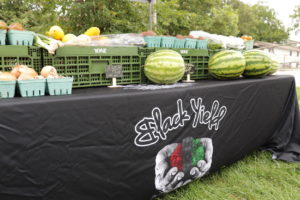To Eric Jackson, a stall in the newly renovated Cherry Hill Town Center is far more than a space to sell locally grown produce. The servant-director and co-founder of the Black Yield Institute envisions it as a hub of activity and a key step in advancing a dream.
“Imagine yourself in the newly renovated space, and you’re seeing the stalls and the various art on the walls. … Off to the side is a stall – a space with hyper-locally grown food and locally grown food that comes from Black farmers and from our farm at the Cherry Hill Urban Community Garden,” Jackson said. “The stall that we’ll have will be an open house for ideas, inspiration and hope.”
The Town Center, which Catholic Charities owns, has long served as an economic and social heart of the South Baltimore neighborhood. It is in the midst of a revival that includes improvements to the facade and the opening of a new Chase Bank branch – the first physical bank in the Cherry Hill community. The next phase of development will include transforming a currently empty 5,000-square-foot area into an open community marketplace with fixed and pop-up stalls for local entrepreneurs.
The vision: a locally owned grocery store
Jackson is part of a years-long quest to open a locally owned grocery store in the South Baltimore neighborhood. Cherry Hill has never had substantial access to fresh, healthy and culturally appropriate foods – a scarcity that he attributes not just to geography but also to considerations rooted in race, class and economic status.
For 11 growing seasons, the Cherry Hill Urban Community Garden has provided some fresh, local produce, selling it to neighbors through twice-monthly pop-up markets and through an alliance of Baltimore-area farmers. But a grocery store would provide far more.

Selling local produce at the Cherry Hill Resource Center
“We’re looking to build off the history of food and community-based land use in Cherry Hill to build something we’ve never seen before,” said Jackson.
After broad consultations helped to flesh out a vision for what the community wanted in a grocery store, Jackson and other advocates began planning the Cherry Hill Food Co-op. Over the past year, some 1,200 people have pledged contributions to the effort, 60 percent more than organizers anticipated. A consultant is now helping the group analyze options, assess sites and continue engagements with the community.
The stall is an important step toward the co-op and the Black Yield Institute’s vision of restoring and energizing the community’s relationships with food, culture and land. The stall will not only sell healthy foods and local products, but also host opportunities for political education, nutritional education, and intergenerational cooking with a focus on foods from the African diaspora – a one-stop shop for nutritional food and community empowerment.
Not a struggle to wage alone
Catholic Charities has remained a close partner as the community’s vision takes shape.
“This is not a struggle we have to wage on our own, but it’s definitely something we have to lead,” Jackson said. “Institutions like Catholic Charities have to hold space for institutions on the ground to say this is how we want you to help us.”
The food co-op aligns with other grassroots work focused on self-determination in Cherry Hill, Jackson said. He mentioned: a broader initiative around political education and consciousness raising; studies that are framing the co-op’s development and providing a baseline assessment of “food apartheid” in Cherry Hill; and an action-building network that allows neighborhood leaders to align with other local and primarily Black-led organizations across Baltimore.
